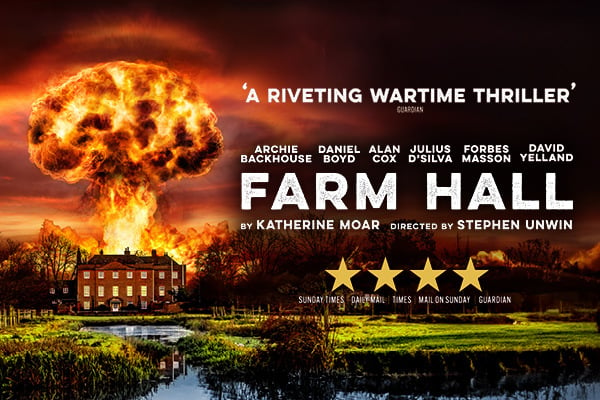Theatre Royal Haymarket, London
Running time: 1hr 45mins (inc. interval)
Age Restrictions:
Tickets from £15.00

**SAVE ON TICKET PRICES Valid all performances 7 - 28 August 2024. Book by 8 July 2024.**
The best-selling show in the history of Jermyn Street Theatre, where it ran in Spring 2023, FARM HALL brings an extraordinary true story to life.
It is Summer 1945: Hitler is dead, but war in the Pacific rages on. The Allies have detained six of Germany’s most gifted nuclear scientists – including three Nobel Prize winners - at Farm Hall, a stately home just outside Cambridge. They entertain themselves with some redacted newspapers, a broken piano and a copy of Noël Coward's Blithe Spirit. But their tranquil summer is shattered by the news that the Americans have succeeded where the Germans failed. The United States has not only built an atom bomb, it has used one against Japan. Unbeknownst to the scientists, during their stay, every inch of Farm Hall was bugged and their every reaction recorded. This play is inspired by the true events that took place at Farm Hall between July 1945 and January 1946.
The stellar cast includes David Yelland (The Crown, Chariots of Fire, Poirot), who plays the role of Max Von Laue; Alan Cox (Say My Name, Mrs Dalloway, Housewife, 49) who plays the role of Werner Heisenberg. Daniel Boyd (On Chesil Beach, Tiger House); who plays the part of Carl Friedrich von Weizsacker; Forbes Masson (EastEnders, Catastrophe) who plays the role of Otto Hahn; Julius D’Silva (The Crown, The Ten Commandments) who plays the role of Kurt Diebner and Archie Backhouse appears as Erich Bagge.
Theatre Royal Haymarket
Theatre Royal Haymarket
18 Suffolk Street
London
SW1Y 4HT
The Theatre Royal Haymarket or Haymarket Theatre is a theatre on The Haymarket in London which dates back to 1720. The original building was a little further north in the same street. It has been at its current location since 1821, when it was redesigned by John Nash. Its current capacity is 888.
The Haymarket has been the site of a couple of significant innovations in theatre. In 1873, it was the venue for the first scheduled matinée performance, establishing a custom soon followed in theatres everywhere. Six years later, its auditorium was reconstructed and the stage was enclosed in the first use of the picture frame proscenium.
Theatre Royal Haymarket History
The Theatre Royal Haymarket's first major success was a 1729 production of Samuel Johnson's Hurlothrumbo, or The Supernatural, which ran for 80 nights -- a record surpassing John Gay's The Beggar's Opera and not to be matched until The Dragon of Wantley. In the 1720's, the Haymarket was an alternative to the patent theatres in every sense. When there was an actor's revolt at Theatre Royal, Drury Lane in 1719, for example, the actors walked out to go to the Haymarket. They returned when they won their demands. In the eight to ten years before the Licensing Act of 1737, the Haymarket Theatre was an alternative to John Rich's Covent Garden theatre and the opera-dominated Theatre Royal Drury Lane. Hurlothrumbo was just one play in that series of anti-Walpolean satires. Henry Fielding staged his plays at the Haymarket Theatre, and so did Henry Carey. Hurlothrumbo would be followed by Tom Thumb, The Dragon of Wantley, Pasquin and others. Additionally, refugees from Drury Lane's and Covent Gardens's internal struggles would show up at the theatre, and thus Charlotte Charke would act there in a parody of her father, Colley Cibber, one of the owners and managers of Drury Lane. The Theatrical Licensing Act, however, put an end to the anti-ministry satires, and it all but entirely shut down the theatre.
In 1862, the theatre was host to a 400-night run of Our American Cousin, with Edward Southern as Lord Dundreary. The play's success brought the word "dreary" into common use.
In 1893, Oscar Wilde premiered A Woman of No Importance, his first comedy. The play returned for a 2003 production directed by Adrian Noble and starring Rupert Graves, Samantha Bond, Prunella Scales and Rachael Stirling.
The theatre underwent a major refurbishment in 1994. In May 2004 it closed for two nights after parts of the ceiling fell down during a performance. About 13 people suffered mainly cuts and bruises when plaster fell into the auditorium during the "When Harry Met Sally..." Show. Since then, the theatre has played host to a short-lived run of Becket directed by John Caird followed in January 2005 by the world premiere of Victoria Wood's new musical Acorn Antiques - based upon the TV series of the same name. This starred Julie Walters, Celia Imrie, Duncan Preston, Neil Morrissey, Sally Ann Triplett and Josie Lawrence and ran until 21 May 2005. The Genius Of Ray Charles - a new American musical followed in the Summer of 2005 running for eight weeks to 13 August 2005. More recently, Bill Kenwright's new production of A Few Good Men played to packed houses starring Rob Lowe, Suranne Jones, John Barrowman and Jack Ellis.
Travel by train: Charing Cross. Nearest tube: Charing Cross Underground Station/Piccadilly Circus